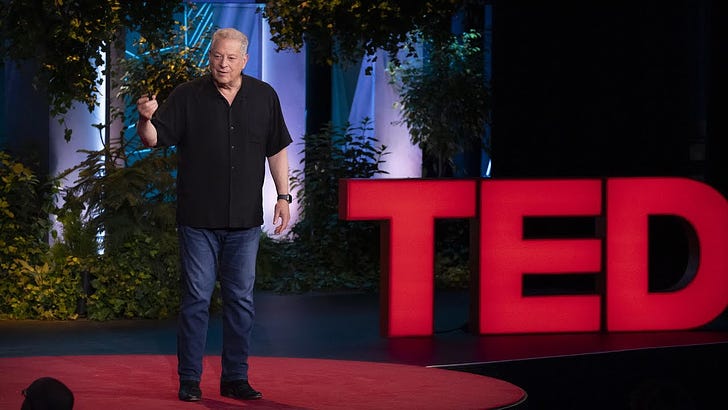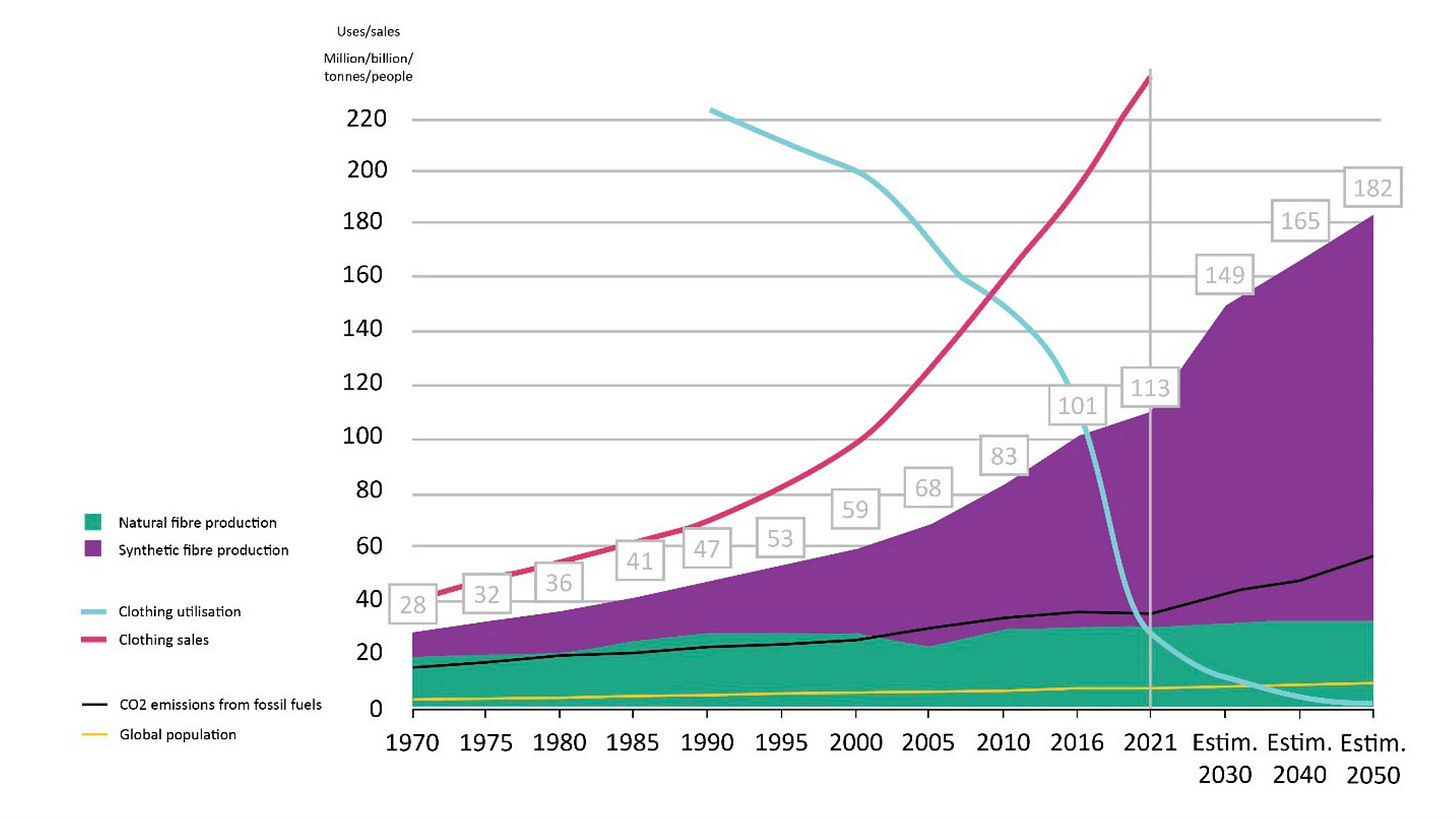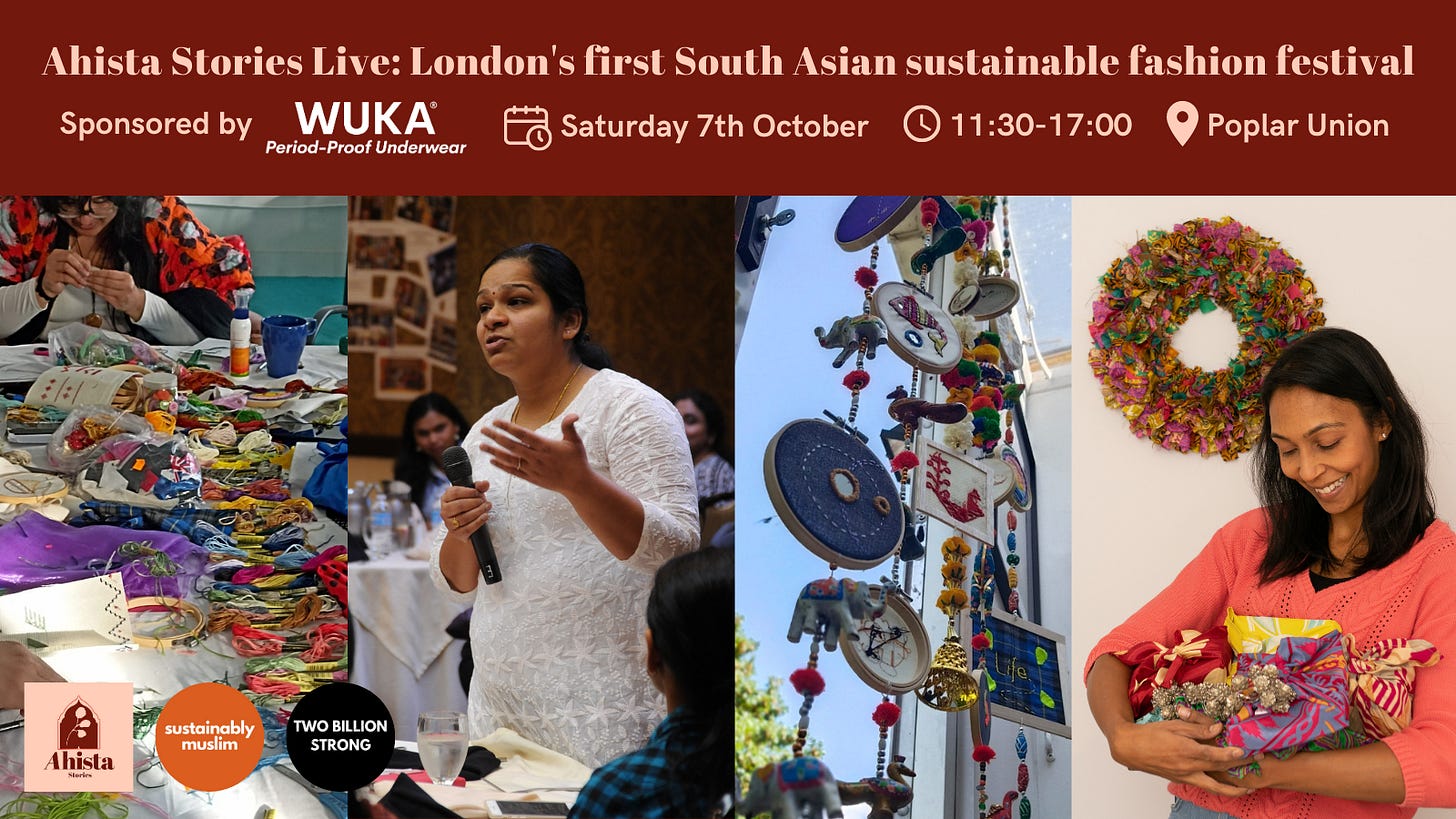Fashion is a social license for fossil fuels
Challenging the social license that fashion provides to Big Oil
“The will to act is itself a renewable resource.” - Al Gore
This new TED Talk is well worth the 25 minutes for a damned account of how the fossil fuel industry has pulled the wool over our eyes and an inspiring call to put it back in its place. For me, the talk was a stark reminder that anything endorsing the continued extraction and combustion of fossil fuels is putting a seal of approval on the devastating impacts of the climate crisis. You guessed it, that includes fashion.
A social license is defined as the acceptance of a practice by the general public. It fits nicely into the Overton Window, a framework used in campaigning to look at how policies or positions are viewed over time. It’s a handy way to think about how to move positive things (eg. eating less meat is good for the environment) into the ‘acceptable’ segment and negative things (eg. deforestation is good for the economy) into the ‘unacceptable’ segment.
One good example of this is the gas lobby cleverly rebranding fossil gas 'as ‘natural gas’ and then manipulating consumers into believing gas cooking creates better food with a decades-long marketing campaign starting with the ‘cooking with gas’ slogan coined in the 1930s. In this way, cooking itself provides a social license for the gas industry, because rather than associating gas cooktops with fossil fuels, we associate them with wholesome home-cooked food or delicious restaurant dishes. Fortunately, the brilliant Global Cooksafe Coalition is tackling this epidemic of misinformation with their major campaign to turn stoves electric (and they’re hiring!).
In a similar vein, the mainstream corporate fashion industry (which Venetia La Manna defines simply as ‘Big Fashion’) provides a social licence for Big Oil (and big gas, and big coal) to operate without the same level of scrutiny that, for example, the auto or aviation industry receives. This is because the majority of consumers do not understand that the clothes they buy, wear and dispose of are made from fossil fuels, in a supply chain powered by fossil fuels. And therefore, because fashion is seen as fun and frivolous (a whole lot of misogyny there which we can get into another time), the fossil fuel industry can rely on the industry to provide a pretty little smokescreen.
There are two important areas that link fashion to fossil fuels; although there are more than two if you count single-use plastic packaging, HFO-fuelled shipping, international air travel and others. The first is the fossil fuels that power the factories and mills that make our clothing, shoes and textiles, and the second is the fossil fuels that synthetic fabrics like polyester, nylon and acrylic are made from.
The first issue is arguably the most important, because while it’s associated with the vast majority of fashion’s greenhouse gas emissions, there is so little transparency of fashion supply chains that brands can sweep this HUGE problem under the rug. The new Fashion Transparency Index talks about this in detail, finding that only 6% of brands tell us what fuel is used in the manufacturing of their clothes. I wrote a viewpoint for the FTI about exactly why this matters - you can read it here.
Meanwhile, some brands are making bold claims about getting rid of coal, but failing to mention that in many cases, coal is simply being replaced by our good friend gas because it produces comparably less emissions, therefore lending another big win to the fossil fuel industry. Another tactic we see is brands refusing to invest in electrification until fossil-heavy grids are cleaned up, rather than the other way around, passing the blame to their suppliers and the governments of the countries they source from, therefore yet again allowing the fossil fuel industry to continue business-as-usual.
Moving onto the second issue, materials, the social license is much more obvious because fashion is so visible in our day-to-day lives. Every time we admire a friend’s outfit or follow a fashion influencer on Instagram, every time we simply get dressed, we are most likely wearing synthetic materials made from petrochemicals and therefore, by dint of looking great and thinking others look great, we’re extending the social contract of Big Oil. While petrol-guzzling SUVs are going out of style, oil companies are increasingly investing in plastics to keep demand growing, and this includes plastic fabrics.
The Plastic Elephant, a new report from Consumption Research Norway (SIFO), exposes an additional element to this social license, linking the problem of overproduction directly to synthetic materials by framing the low price of synthetics as the condition for unsustainable growth of the fashion sector. So yet again, the fossil fuel industry is empowered by fashion’s profit-driven seal of approval - we grow, you grow, everybody grows. The graph below shows this relationship quite starkly:
I’ve only scratched the surface here, but hopefully it provides some food for thought about who we’re really defending when we defend the actions of Big Fashion, the friendly frontline of the fossil fuel industry. I’ll leave you with this quote from the brilliant new War on Want report, Fashioning the future:
“Many garment producing countries have sought to expand their own fossil fuel-based industries, not with the primary intention of meeting the needs of their citizens, but in order to produce ‘cheap energy’ for the industrial sectors. Yet, the fashion industry remains unaccountable for the environmental impact of this expansion.” - Asad Rehman
Ahista Stories
My brilliant friend Zainab Mahmood has launched a brand new South Asian sustainable fashion community called Ahista Stories (‘ahista’ means ‘slow’ in Urdu). Here, she writes about Ahista’s inaugural South Asian sustainable fashion festival. Check it out!
In partnership with Sustainably Muslim and Two Billion Strong, Ahista Stories brings you Ahista Stories Live, London’s first South Asian sustainable fashion festival. Sponsored by WUKA, Ahista Stories Live consists of panels, workshops and market stalls celebrating traditional South Asian clothes and the people who make them.
Panel discussions on topics such as garment worker exploitation will educate and inspire attendees to take action; market stalls of sustainable brands will offer practical alternatives to mindless shopping; and workshops on mending, upcycling and embroidery will teach skills to help celebrate and extend the life of clothes. Tickets for Ahista Stories Live start at £5 and can be booked here.
Location: Poplar Union, 2 Cotall St, London E14 6TL
Date: Saturday 7th October
Time: 11:30-17:00
Follow us on Instagram @ahista.stories and sign up to our mailing list for updates.
The cost of living crisis is crisis-ing. So please forgive me for the brief advertising interlude. Two brands I am a regular paying customer of have offered up discount codes for my subscribers. Just follow the links below:
Homethings - Plastic-free refillable cleaning products
Use code ‘RUTHMACGILP’ for 15% offThe Body Shop - Cruelty-free skincare, hair and beauty
Use code ‘14315’ for 20% off
Finally if you’re a long-time subscriber you’ll remember I used to offer a paid version of this newsletter once a week. While this has been on pause for the last couple of years, I want to know whether you’d be interested in subscribing for extra content. I’m thinking about this content being in the form of mini podcast episodes, because a) My frazzled attention span can barely handle long-form writing anymore, and b) I miss Common Threads. The free monthly newsletter would still be available. Please fill in the survey below to help me out!
Thank you for reading! See you next month.





